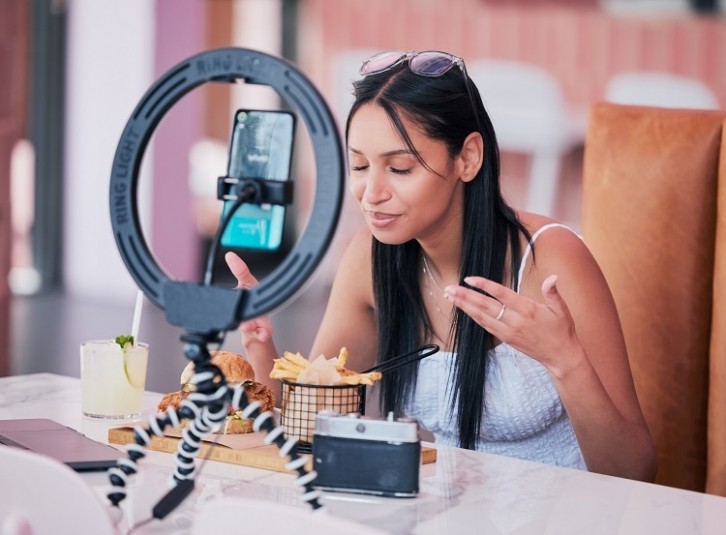EU urged to ban influencer promotion of HFSS products to kids, ‘name & shame’ non-compliant players

Influencer marketing refers to a trader or a person acting in the name of a trader advertising products or services in exchange for remuneration (or promoting their own products instead).
It is a fast-growing sector, and one that according to The Consumer Organization (BEUC), comes with problematic practices for consumers, such as the promotion of unhealthy food to children.
BEUC is calling for regulatory reform in a similar vein to that recently adopted by France, but with the inclusion of a ban on the promotion of foods high in fat, sugar and salt (HFSS) to kids.
Blurring the line between editorial and advertised content
Influencer marketing has revolutionised marketing campaigns, which were traditionally very controlled and regulated, explained BEUC in its new paper “From influence to responsibility: Time to regulate influencer marketing’.
Whereas previously, consumers could easily identify an advertisement, today anyone with a social media account can advertise. “The line between editorial content and advertised content is more and more blurred for consumers,” noted the consumer organisation.
What is crystal clear is the effectiveness of influencer marketing. In a survey conducted by Open Evidence on behalf of BEUC, over half of respondents reported buying products or services recommended by influencers.
A 2019 survey conducted across France, Germany, Australia, and the US on behalf of Rakuten Marketing, revealed that among consumers who actively engage on social media platforms, 41% recently discovered new brands and products through influencers with 80% purchasing the product directly via the influencer’s provided link.
Defining ‘influencer marketing’
Despite its influence, BEUC is concerned ‘influencer marketing’ is not properly regulated. At EU level, there is no specific legislation on ‘influencer marketing’ (although the Unfair Commercial Practices Directive (UCPD) is applicable to influencer marketing practices). Nor does a definition for ‘influencer marketing’ currently exist within EU law.
At the same time, the Irish Competition and Consumer Protection Commission (CCPC), the UK’s Advertising Standards Authority (ASA), and France’s Direction Générale de la Concurrence, de la Consommation et de la Répression des frauds (DGCCRF) have all raised concerns over the lack of transparency within the influencer marketing sector.
BEUC proposes an EU approach to tackling issues raised by influencer marketing be developed, starting with a definition added within the Unfair Commercial Practices Directive (UCPD).
BEUC’s proposed recommendation for a definition reads: “Influencer Marketing is an action whereby a natural or legal person communicates, by electronic means, a content intended to promote directly, or indirectly, goods, services or any other causes, with a commercial intent, to an audience with who said person builds relationships (mainly on social media platforms) and engages online, or otherwise, with commercial actors throughout different business models for monetisation purposes.”
For BEUC, the size of the influencer audience, the recurrence with which they run commercial partnerships, and whether brands have control over the content of the publication or not, should be irrelevant under this new definition.
Other proposals include the enforcement of a clear and unique term such as ‘advertisement’ to increase transparency within posts, as well as a ‘rebuttable presumption’ that influencers are in a commercial relationship with traders to protect against hidden advertising.
Making all actors in the influencer ‘value chain’ liable
The influencer marketing ‘value chain’ is made up of several key players, such as the influencer themselves, brands, the online platforms, and influencer agencies. However as it stands, when hidden or insufficient disclosure of advertising occurs, it is unclear whether all actors in the value chain are held accountable.
BEUC wants to ensure all players within this chain are liable, including influencers, their agencies, and brands. Introducing a joint and several liability between these actors would ensure that in case of breach of consumer law requirements, all the players would be held accountable. This is already being investigated at a national level in Norway, Belgium, the Netherlands, and the UK.
In the case of non-compliance, the consumer organisation proposes that dissuasive sanctions be enforced, such as a percentage of their annual turnover.
Further, BEUC suggests competent enforcement authorities ‘name & shame’ non-compliant influencers, agencies and traders. And in case of sanction from a national authority or from a court, influencers should be required to reference the national authority’s decision at the beginning of each publication for a ‘sufficiently long’ period.
Banning influencer marketing campaigns for HFSS foods
In France, the government recently banned commercial influencing on social media of certain products due to risk of consumer harm and public health interests. Such products and services include aesthetic surgery, nicotine products, advertising involving wild animals, and betting sites.
BEUC welcomed France’s stance but noted an important omittance: the promotion of unhealthy food and drink to children.
The consumer organisation has observed an increasing rise of influencers entering into paid partnerships with brands promoting HFSS products, many of which are targeting children. “Rules are too lax, not suited to new digital marketing practices, especially influencer marketing, and still permit foods which are high in fats, salt and sugar to be marketed to children.”
BEUC recommends online marketing of unhealthy food products, including influencer marketing, be banned and added to the UCPD Annex, as an unfair commercial practice ‘in all situations’.
“In our view, the prohibitions recently enshrined in France should serve as a basis for the European Commission to establish an EU-wide ban of promotion of these products and services by influencers,” noted the consumer organisation.
BEUC is calling on the Commission to consider amending the UCPD Annex to ban the direct or indirect promotion by influencers of HFSS foods to kids, as well as alcohol products, gambling, and medical products.








